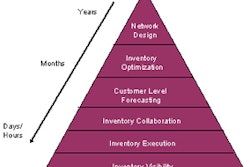Knoxville, TN — January 17, 2007 — As part of the University of Tennessee's mission to help the U.S. Air Force streamline its operations, more than 30 high-ranking Air Force officers and civilians graduated January 11 from a six-month program in which they learned to use business tools to promote efficiency.
The Master Process Officer Program is part of a five-year, $25 million contract between UT and the Air Force signed last year. As part of the contract, UT assists the Air Force by developing curriculum, teaching programs, providing technical assistance and coming up with cost-saving ideas and models.
Brig. Gen. Taco Gilbert III, who heads Air Force Smart Operations for the 21st Century (AFSO 21) from the Pentagon, said the Air Force chose UT as its academic partner because UT was willing to tailor a program specifically for Air Force personnel. AFSO 21 is an initiative launched last year to streamline Air Force operations.
In the Master Process Officer course, select Air Force officers and civilians from bases worldwide were taught to use business improvement initiatives, including Lean, Six Sigma, the Theory of Constraints and business process re-engineering to improve processes and cut costs.
"Our project with the Air Force is the largest Lean effort worldwide," said Alex Miller, associate dean for executive education at UT's College of Business Administration. "The Air Force is committed to greatly improving the efficiency of its operations."
Gen. Kevin P. Chilton, commander of the Air Force Space Command at Peterson Air Force Base in Colorado, participated in the graduation to recognize the graduates and reiterate the importance of AFSO 21.
Chilton is responsible for the development, acquisition and operation of the Air Force's space and missile systems and plays a key role in steering the AFSO 21 effort. He is also a veteran of three space flights, having been the pilot on the maiden voyage of Endeavor in 1992, the pilot of Endeavor's Space Radar Laboratory mission in 1994, and the commander of the Atlantis docking mission to the Russian space station, Mir, in 1996.
Chilton spoke to the graduates about the importance of AFSO 21 and their role in implementing it. "If you're in industry, you're interested in the bottom line," Chilton said. "In our Air Force, that's not how we measure success. We measure success in combat effectiveness."
Chilton said the Air Force must find a way to maintain its excellence in combat readiness in the face of pending cuts. The Air Force, now about 360,000 strong, is looking at reducing its force by about 40,000, or about 12 percent, in coming years, Chilton said. "It's imperative we get more efficient," he said.
Learning to go Lean
Air Force senior leaders selected the staff members who participated in the Master Process Officer program.
Participants spent the first and last weeks of the program on UT's Knoxville campus. Online "distance learning" allowed them to complete the rest of the coursework while on the job. Participants honed their skills and applied their learning by attending and facilitating six "rapid improvement events" at Air Force bases across the country. During these events, teams of participants analyzed specific tasks and processes to find time-saving and cost-cutting suggestions.
Gilbert, who also was a student in this first class, said the idea isn't "to do more with less, but rather to eliminate unnecessary work. "We are a nation at war, and we have to focus our resources on improving combat capability to win that war and ensure a strong and relevant Air Force into the future," he said.
Col. Mike Smith, whose responsibilities have increased within the AFSO 21 program while enrolled in the Master Process Officer course, said the Air Force, like private sector businesses, must contend with growing expenses, including the need for new aircraft and rising employee healthcare costs.
Although Lean has been used to streamline specific Air Force operations for several years, Air Force Secretary Michael Wynne implemented it system-wide through AFSO 21 in March 2006. "The chief of staff and secretary understand Lean and know it's an avenue we can use to increase Air Force capability," Smith said. "If you can increase capability, but not increase spending, it's a win for everybody."
One of the strategies, he said, is to teach people not to think just about their jobs, but rather how their jobs help achieve the desired end product.
MPOs on Front Line
The newly trained Master Process Officers will play a key role in identifying specific Air Force processes to review and streamline. Some of these improvements will affect tasks done only at the local level; some will change operations system-wide.
AFSO 21 officials have broken down all Air Force operations into 10 key processes, including planning and executing strategic initiatives; developing and sustaining warfighters and warfighting systems; conducting air, space and cyber operations; caring for people; providing IT support; and managing financial resources.
Smith said there are five goals in AFSO 21 operations: to increase productivity of people, to increase asset availability, to improve agility and response time, to conserve energy and to promote safety.
Col. Lida Dahnke of Hurlburt Air Force Base in Florida said the concept of using rank-and-file officers to recommend changes will be key to AFSO 21's success. "You're getting so many different people involved in order to get better ideas and deeper buy-in. That makes it effective," she said.
For this inaugural AFSO 21 class, Keith Leitner served as UT's lead faculty member. Professor Kenneth Kirby and William "Bill" Peterson of UT and John Allen, Marshall Kaufman and Ron Turkett, all of Total Systems Development, were mentors to program participants.
The second AFSO 21 Master Process Officer course began in November. Those 36 participants will graduate in May.
The Master Process Officer Program is part of a five-year, $25 million contract between UT and the Air Force signed last year. As part of the contract, UT assists the Air Force by developing curriculum, teaching programs, providing technical assistance and coming up with cost-saving ideas and models.
Brig. Gen. Taco Gilbert III, who heads Air Force Smart Operations for the 21st Century (AFSO 21) from the Pentagon, said the Air Force chose UT as its academic partner because UT was willing to tailor a program specifically for Air Force personnel. AFSO 21 is an initiative launched last year to streamline Air Force operations.
In the Master Process Officer course, select Air Force officers and civilians from bases worldwide were taught to use business improvement initiatives, including Lean, Six Sigma, the Theory of Constraints and business process re-engineering to improve processes and cut costs.
"Our project with the Air Force is the largest Lean effort worldwide," said Alex Miller, associate dean for executive education at UT's College of Business Administration. "The Air Force is committed to greatly improving the efficiency of its operations."
Gen. Kevin P. Chilton, commander of the Air Force Space Command at Peterson Air Force Base in Colorado, participated in the graduation to recognize the graduates and reiterate the importance of AFSO 21.
Chilton is responsible for the development, acquisition and operation of the Air Force's space and missile systems and plays a key role in steering the AFSO 21 effort. He is also a veteran of three space flights, having been the pilot on the maiden voyage of Endeavor in 1992, the pilot of Endeavor's Space Radar Laboratory mission in 1994, and the commander of the Atlantis docking mission to the Russian space station, Mir, in 1996.
Chilton spoke to the graduates about the importance of AFSO 21 and their role in implementing it. "If you're in industry, you're interested in the bottom line," Chilton said. "In our Air Force, that's not how we measure success. We measure success in combat effectiveness."
Chilton said the Air Force must find a way to maintain its excellence in combat readiness in the face of pending cuts. The Air Force, now about 360,000 strong, is looking at reducing its force by about 40,000, or about 12 percent, in coming years, Chilton said. "It's imperative we get more efficient," he said.
Learning to go Lean
Air Force senior leaders selected the staff members who participated in the Master Process Officer program.
Participants spent the first and last weeks of the program on UT's Knoxville campus. Online "distance learning" allowed them to complete the rest of the coursework while on the job. Participants honed their skills and applied their learning by attending and facilitating six "rapid improvement events" at Air Force bases across the country. During these events, teams of participants analyzed specific tasks and processes to find time-saving and cost-cutting suggestions.
Gilbert, who also was a student in this first class, said the idea isn't "to do more with less, but rather to eliminate unnecessary work. "We are a nation at war, and we have to focus our resources on improving combat capability to win that war and ensure a strong and relevant Air Force into the future," he said.
Col. Mike Smith, whose responsibilities have increased within the AFSO 21 program while enrolled in the Master Process Officer course, said the Air Force, like private sector businesses, must contend with growing expenses, including the need for new aircraft and rising employee healthcare costs.
Although Lean has been used to streamline specific Air Force operations for several years, Air Force Secretary Michael Wynne implemented it system-wide through AFSO 21 in March 2006. "The chief of staff and secretary understand Lean and know it's an avenue we can use to increase Air Force capability," Smith said. "If you can increase capability, but not increase spending, it's a win for everybody."
One of the strategies, he said, is to teach people not to think just about their jobs, but rather how their jobs help achieve the desired end product.
MPOs on Front Line
The newly trained Master Process Officers will play a key role in identifying specific Air Force processes to review and streamline. Some of these improvements will affect tasks done only at the local level; some will change operations system-wide.
AFSO 21 officials have broken down all Air Force operations into 10 key processes, including planning and executing strategic initiatives; developing and sustaining warfighters and warfighting systems; conducting air, space and cyber operations; caring for people; providing IT support; and managing financial resources.
Smith said there are five goals in AFSO 21 operations: to increase productivity of people, to increase asset availability, to improve agility and response time, to conserve energy and to promote safety.
Col. Lida Dahnke of Hurlburt Air Force Base in Florida said the concept of using rank-and-file officers to recommend changes will be key to AFSO 21's success. "You're getting so many different people involved in order to get better ideas and deeper buy-in. That makes it effective," she said.
For this inaugural AFSO 21 class, Keith Leitner served as UT's lead faculty member. Professor Kenneth Kirby and William "Bill" Peterson of UT and John Allen, Marshall Kaufman and Ron Turkett, all of Total Systems Development, were mentors to program participants.
The second AFSO 21 Master Process Officer course began in November. Those 36 participants will graduate in May.












